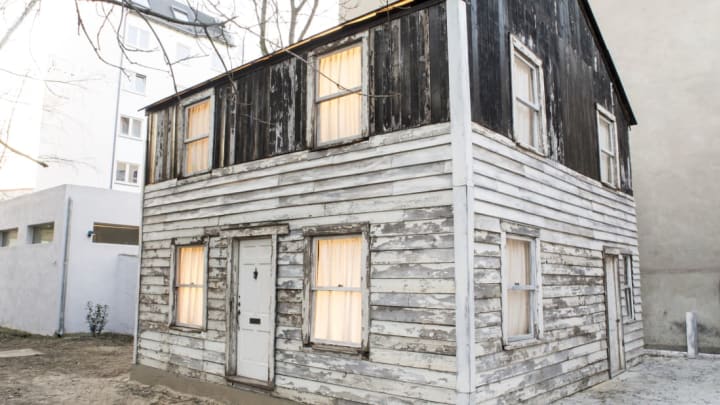The humble wooden house that Rosa Parks moved into after fleeing to Detroit in the fallout of her historic Montgomery bus protest will be auctioned off by Guernsey’s next month. The house has been taken apart, reassembled, and displayed in different locations over the years—including destinations as far-flung as Berlin, Germany—and the structure could theoretically be rebuilt anywhere.
The sale of the home will be part of Guernsey’s “African American Historic & Cultural Treasures” auction to be held July 25-26 in New York City, and proceeds from the house will benefit the Rosa McCauley Parks Heritage Foundation.
The fact that the home is still standing is testament to the resilient spirit of Rosa Parks, but it wasn’t always in such great shape. The home, formerly owned by Parks’s brother, fell into disrepair over the years and was slated to be demolished by the city of Detroit.
That’s when Parks’s niece, Rhea McCauley, stepped in. She bought the house for $500 and handed it over to Ryan Mendoza, an artist who promised to preserve the structure as a monument. He took it apart, transported it thousands of miles to Berlin, and rebuilt the house in his yard, where it remained on public display.
“A lot of people did think that that house was not worth saving because there’s so many in Detroit that looks just like that house,” Mendoza told the BBC. “It sort of goes without saying that she’s a national icon and what she did was so important for so many millions of people even if they don’t know it.”
Most recently, the home was displayed as part of a symposium with the Rhode Island School of Design.
After Parks was arrested on December 1, 1955, for refusing to give up her bus seat to a white man, she lost her job and received a steady stream of death threats. Two years later she and her family decided to move north, and the Detroit home she shared with 17 other relatives represented “a place of love and of peace,” McCauley told the BBC.
Also heading to the auction block is a handwritten account of Rosa Parks’s first meeting with Martin Luther King, Jr., in August 1955, about four months before her bus protest. She wrote of her first impression, “I was amazed and astonished at the youthful appearance and the profound and eloquent speech delivered by Rev. M.L.K. Jr. I knew I would never forget him.”
Other notable items up for sale include a Jackson Five recording contract, signed by Joe Jackson; original score sheets of music from The Supremes and The Temptations; and hundreds of movie posters documenting African Americans’ role in film.
